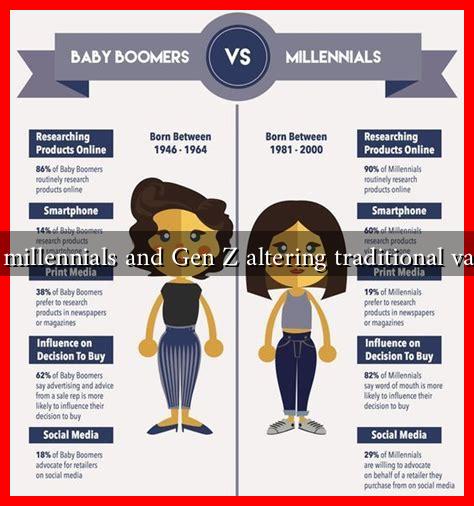-
Table of Contents
Are Millennials and Gen Z Altering Traditional Values?
As the world evolves, so do the values and beliefs of its younger generations. Millennials (born approximately between 1981 and 1996) and Generation Z (born from 1997 onward) are often seen as the harbingers of change, challenging and reshaping traditional values in various aspects of life. This article explores how these two generations are influencing societal norms, work ethics, family structures, and consumer behavior.
Shifting Perspectives on Work and Career
One of the most significant areas where millennials and Gen Z are altering traditional values is in the workplace. Unlike previous generations, who often prioritized job security and long-term employment, younger workers are more inclined to seek fulfillment and purpose in their careers. This shift can be attributed to several factors:
- Desire for Work-Life Balance: Millennials and Gen Z value flexibility and work-life balance over traditional 9-to-5 jobs. A survey by Gallup found that 54% of millennials would leave their current job for one that offers better work-life balance.
- Emphasis on Purpose: Many young workers are motivated by a sense of purpose. According to a study by Deloitte, 70% of millennials say that a company’s commitment to social issues influences their decision to work there.
- Gig Economy Participation: The rise of the gig economy has provided younger generations with alternative career paths. A report from McKinsey indicates that up to 30% of the U.S. workforce is engaged in gig work, with millennials and Gen Z leading this trend.
Redefining Family Structures
Millennials and Gen Z are also redefining what family means. Traditional family structures, often characterized by a nuclear family model, are being challenged as these generations embrace diverse family dynamics. Key changes include:
- Delayed Marriage and Parenthood: Many millennials and Gen Z individuals are choosing to marry and have children later in life. The U.S. Census Bureau reports that the average age of first marriage has risen to 30 for men and 28 for women.
- Acceptance of Diverse Relationships: There is a growing acceptance of various relationship types, including same-sex couples and single-parent families. A Pew Research Center study found that 39% of millennials believe that being a single parent is just as good as being in a traditional marriage.
- Focus on Friendships as Family: Younger generations often prioritize friendships and community over traditional family ties, leading to the concept of “chosen family.” This shift reflects a broader understanding of support systems beyond biological connections.
Consumer Behavior and Values
Millennials and Gen Z are also changing the landscape of consumer behavior. Their purchasing decisions are heavily influenced by their values, leading to a demand for transparency and ethical practices from brands. Key trends include:
- Sustainability: Younger consumers are more likely to support brands that prioritize sustainability. A Nielsen report found that 73% of millennials are willing to pay more for sustainable products.
- Brand Activism: Millennials and Gen Z expect brands to take a stand on social issues. A study by Cone Communications revealed that 87% of millennials would purchase a product from a company that advocates for a cause they care about.
- Digital Natives: Growing up in the digital age, these generations are adept at using technology to research products and share their opinions. This has led to a rise in influencer marketing and social media-driven purchasing decisions.
Conclusion
Millennials and Gen Z are undeniably altering traditional values across various aspects of life, from work and family structures to consumer behavior. Their emphasis on purpose, flexibility, diversity, and sustainability reflects a broader cultural shift towards inclusivity and social responsibility. As these generations continue to mature and take on leadership roles, their influence will likely shape the future of society in profound ways.
In summary, understanding the values and behaviors of millennials and Gen Z is crucial for businesses, policymakers, and society at large. By embracing these changes, we can foster a more inclusive and progressive future that aligns with the evolving needs and aspirations of younger generations.
For further insights on generational differences and their impact on society, you can explore resources from Pew Research Center and Gallup.

